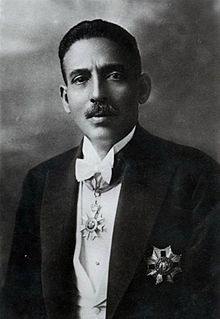
The Emirate of Transjordan,officially known as the Amirate of Trans-Jordan,was a British protectorate established on 11 April 1921,which remained as such until achieving formal independence as the Kingdom of Transjordan in 1946.
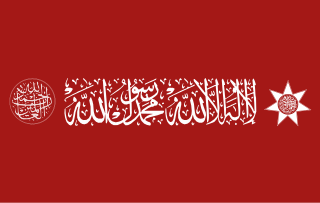
The Hashemites,also House of Hashim,are the royal family of Jordan,which they have ruled since 1921,and were the royal family of the kingdoms of Hejaz (1916–1925),Syria (1920),and Iraq (1921–1958). The family had ruled the city of Mecca continuously from the 10th century,frequently as vassals of outside powers,and ruled the thrones of the Hejaz,Syria,Iraq,and Jordan following their World War I alliance with the British Empire.

Ghazi ibn Faisal was King of Iraq from 1933 to 1939 having been briefly Crown Prince of the Kingdom of Syria in 1920. He was born in Mecca,and was the only son of Faisal I. He died in a car accident in Baghdad in 1939,where he was succeeded by Faisal II.

Ja'far Pasha al-Askari was an Iraqi politician who served twice as Prime Minister of Iraq in 1923–1924 and again in 1926–1927.

Yasin al-Hashimi was an Iraqi military officer and politician who twice served as Prime Minister of Iraq. Like many of Iraq's early leaders,al-Hashimi served as a military officer during the Ottoman control of the country. He made his political debut under the government of his predecessor,Jafar al-Askari,and replaced him as prime minister shortly after,in August 1924. Al-Hashimi served for ten months before he was replaced,in turn by Abdul Muhsin al-Sa'dun. Over the next ten years he filled a variety of governmental positions finally returning to the office of prime minister in March 1935. On 30 October 1936,Hashimi became the first Iraqi prime minister to be deposed in a coup,which was led by General Bakr Sidqi and a coalition of ethnic minorities. Unlike al-Askari,who was then his minister of defense,al-Hashimi survived the coup and made his way to Beirut,Lebanon,where he died three months later. His older brother and close ally,Taha al-Hashimi,served as Prime Minister of Iraq in 1941.

Jamil Al Midfai was an Iraqi politician. He served as the country's prime minister on five separate occasions.

Abd al-Ilah of Hejaz was a cousin and brother-in-law of King Ghazi of the Hashemite Kingdom of Iraq and was regent for his nephew King Faisal II,from 4 April 1939 to 23 May 1953,when Faisal came of age. Abd al-Ilah also held the title of Crown Prince of Iraq from 1943 to 1953.

Lahej,the Sultanate of Lahej,or,sometimes,the Abdali Sultanate,was a Sheikdom based in Lahij in Southern Arabia. The Sultanate became self-ruling in 1728 and gained independence in 1740. In 1839,the Sultanate became part of the Aden Protectorate of the British Empire,though nominally the 'Abdali Sultan retained his status. The Aden Protectorate was briefly ruled again by the Ottomans during World War I,but regained by the British after the Ottoman defeat in World War I and absorbed into Federation of South Arabia in 1963. The 'Abdali dynasty was officially abolished in 1967,with the proclamation of South Yemen.

The Hashemite Kingdom of Iraq was a state located in the Middle East from 1932 to 1958.
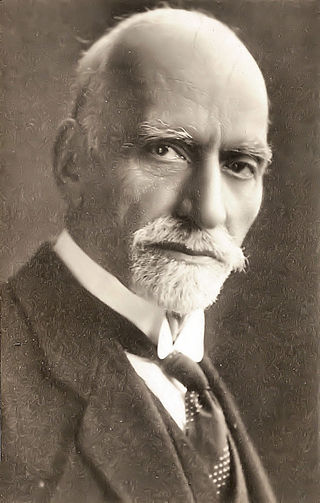
Sir Sassoon Eskell,KBE,also known as Sassoon Effendi was an Iraqi statesman,politician and financier. He is regarded in Iraq as the Father of Parliament. Eskell was the first Minister of Finance in the Kingdom and a permanent Member of Parliament until his death. Along with Gertrude Bell and T. E. Lawrence,he was instrumental in creating and establishing the Kingdom of Iraq post-Ottoman rule,and he founded the nascent Iraqi government's laws and financial structure.

Hamdi al-Pachachi,Iraqi politician born to a prominent family in Baghdad. He studied law at the Royal School in Istanbul,graduating in 1909. He taught at the Baghdad Law School from 1913 to 1916. While in Istanbul,he joined the Covenant Society and became active in the Arab nationalist movement. Upon his return to Baghdad,he joined with the nationalists,who were demanding the decentralization of the Ottoman Empire. As a result of his political activities in support of the Iraqi revolt against the British in 1920,al-Pachachi was arrested and exiled to Hanja,an island in the Persian Gulf. After his release,he continued to take part in anti-British activities. Hamdi ala Pachachi had three daughters.

Naji al-Suwaydi was an Iraqi politician who served as Prime Minister of Iraq from November 1929 to March 1930.

Established in 1920,the Ministry of Justice of Iraq (MoJ) is the federal government ministry concerned with judicial and prosecutorial training,publishing the Official Gazette,notaries public,deeds and records,and since 5 June 2004,prisons. In 2007,the ministry possessed a staff of 13,619. Also,130 courthouses and headquarters are located at the Ministry of Justice Building.
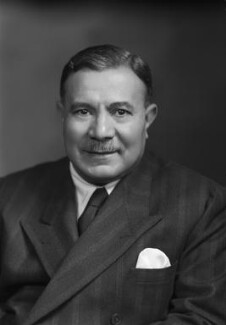
Sayyid Salih Jabr was an Iraqi statesman who served as Prime Minister of Iraq from March 1947 to January 1948. Jabr was the first Shi'i Muslim to become the prime minister of his country and throughout his career held several offices around the country such as the office of minister of justice,education,foreign affairs,interior,and finance.
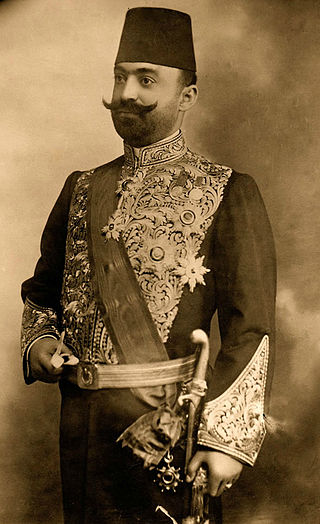
Talib Pasha bin Rajab Al-Naqib Al-Refa'i was an Iraqi politician,who became the first Minister of Interior in Iraq.
Yusuf al-Sa'dun (1888–1980) was a Syrian rebel commander in the Hananu Revolt based in the Jabal Qusayr area near Antioch in modern-day Turkey. His memoirs of the revolt is the only known rebel testimony available about the revolt that "does not slip into ideological discourse",according to historian Nadine Meouchy.
Rustam Haidar was an Iraqi politician of Lebanese descent who served as Minister of Finance of the Kingdom of Iraq from 1930 to 1932 and from 1938 to 1940. He also was an aide to King Faisal I,Defense Minister,and Finance Minister of Iraq. Rustam Haidar is considered an important figure in the history of the modern Iraqi state and worked in many Iraqi ministries despite being of Lebanese origin. Joining the forces of Faisal I,he was a companion of the young emir throughout his life until his death during a trip to Switzerland. Seven years later,Haidar was subjected to a mysterious assassination and was buried next to King Faisal I at the Iraqi Royal Cemetery in Baghdad.
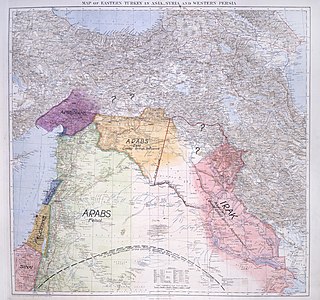
The Sharifian or Sherifian Solution was an informal name for post-Ottoman British Middle East policy and French Middle East policy of nation-building. As first put forward by T. E. Lawrence in 1918,it was a plan to install the three younger sons of Hussein bin Ali al-Hashimi as heads of state in newly created countries across the Middle East,whereby his second son Abdullah would rule Baghdad and Lower Mesopotamia,his third son Faisal would rule Syria,and his fourth son Zeid would rule Upper Mesopotamia. Hussein himself would not wield any political power in these places,and his first son,Ali would be his successor in Hejaz.
The Chamber of Deputies of Iraq was the elected lower house of the bicameral parliament established by the Mandatory Iraq's 1925 constitution. There were initially 87 deputies,who were elected The Chamber of Deputies remained in existence until the 1958 revolution. The number of deputies was later increased to 141.

Al-Sa'doun Street or al-Sa'adoun Street is one of the main streets of Baghdad,Iraq,which connects the districts of al-Rusafa and eastern Karrada and located in al-Sa'doun neighborhood. The street runs from al-Tahrir Square to the Kahramana Square where the Kahramana monument is located with al-Firdos Square located in the middle of it which contains the 17th of Ramadan Mosque,the Palestine Hotel and the Ishtar Hotel. The street was also notable for including many cinemas,cafés,libraries,and shops.
